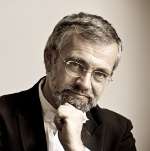It is an interesting, if probably purely coincidental parallel, that the first two piano concertos by Ludwig van Beethoven were programmed by the Sydney Symphony Orchestra to be performed within weeks of each other by two of the grande dames of the touring platform. Although Martha Argerich pulled out at the last minute from performing the First Piano Concerto, Sydney-siders had a chance this week to hear Imogen Cooper as the soloist in Piano Concerto no. 2 in B flat major.
Many people of my generation grew up in admiration of the British pianist’s recordings of Schubert's piano works in the late 1980s (she then re-recorded the series some twenty years later). On Friday night, I was wondering if her interpretation of the “old” Schubert, still in his late twenties, but mere years before his death, would be very different to the “young” Beethoven, who composed his Second Piano Concerto at much the same age.
At first appearance, the similarities seemed to be obvious. Like that of her last teacher, Alfred Brendel, Cooper’s playing was poised and self-assured. In the opening movement, as if continuing an already started animated conversation, her recitativo-like first entry was immediately involved and involving. However, nothing was taken for granted, and this chatty, light-hearted pianism changed appropriately and without warning, later in the movement’s exposition under her expert fingers with the surprising arrival of the tender D flat major theme.
The orchestra invited ex-patriot Australian musician Simone Young to conduct. Young clearly trusted her players and gave them more or less free rein in the accompaniment of the concerto. This had some positive results as principal players led their sections while never losing visual and audial contact with each other, as if they were involved in a chamber music performance. At the same time, more leadership (or perhaps rehearsal time) would have made, for example, the orchestral introduction of the slow movement intimate, rather than perfunctory. Thus, the sublime “prayer” theme sounded much more inward and meditative when repeated in the solo part.
It was a polished performance by Cooper but not a boisterous one. In the third movement, in particular, her approach seemed to contain the wit, the often unexpected cheeky off-beat accents or the charming trochee (long-short-long-short) lilt of the B flat major episode and that, to my ears, was not befitting young Beethoven’s exuberant excesses. While I admire Cooper’s mature and graceful artistry, this concerto may not have been the ideal choice to transmit it.
Young is well-known for her predilection for and experience in late-Romantic repertoire, so it did not come as a surprise that Anton Bruckner’s Symphony no. 5 in B flat major completed the programme. Young has always been a favourite of Sydney audiences and in this performance it quickly became apparent that the orchestra also like working with her.
She is the master of large musical forms, therefore Bruckner’s majestic musical lines and long movements cause her no problem. She does much of the refined shaping with delicate gestures of her left hand. The baton in her right often seems like an optional tool, as the heart of the beat (reacting to the heartbeat of the music) usually remains in her right hand, rather than – as with some other conductors – expressed by the tip of the baton.
What she does not understand about mixing tone colours, balances between various sections, driving an accelerando to an inevitable climax and other technicalities, is probably not worth knowing. At the same time, when she elects to micro-manage, it can bring mixed results; for example, in the opening G flat major tutti of the first movement (and later, when the same phrase occurred) she individually indicated the timing of the two semiquavers, and different sections of the orchestra responded differently to these gestures.
The first movement’s large arch with its powerful themes set the scene before the challenging beginning of the slow movement. At first, the opening pizzicato accompaniment divides the bar into six units, while the theme, a few bars later, into four, slightly larger ones. The ambiguity of the two simultaneous rhythmic structures is deliberate and was, in this performance, perhaps overly emphasised; I would have preferred more clarity in the character of the melody. The Finale’s massive fugue is a delight to the ears in its rich counterpoint; however, its incessantly repeated themes make at least understandable (if not forgivable) the conductor’s unauthorised decision at the 1894 première to cut 122 bars from this movement. They have been reinstated here, of course, and contributed in the build-up to the symphony’s majestic climax.


